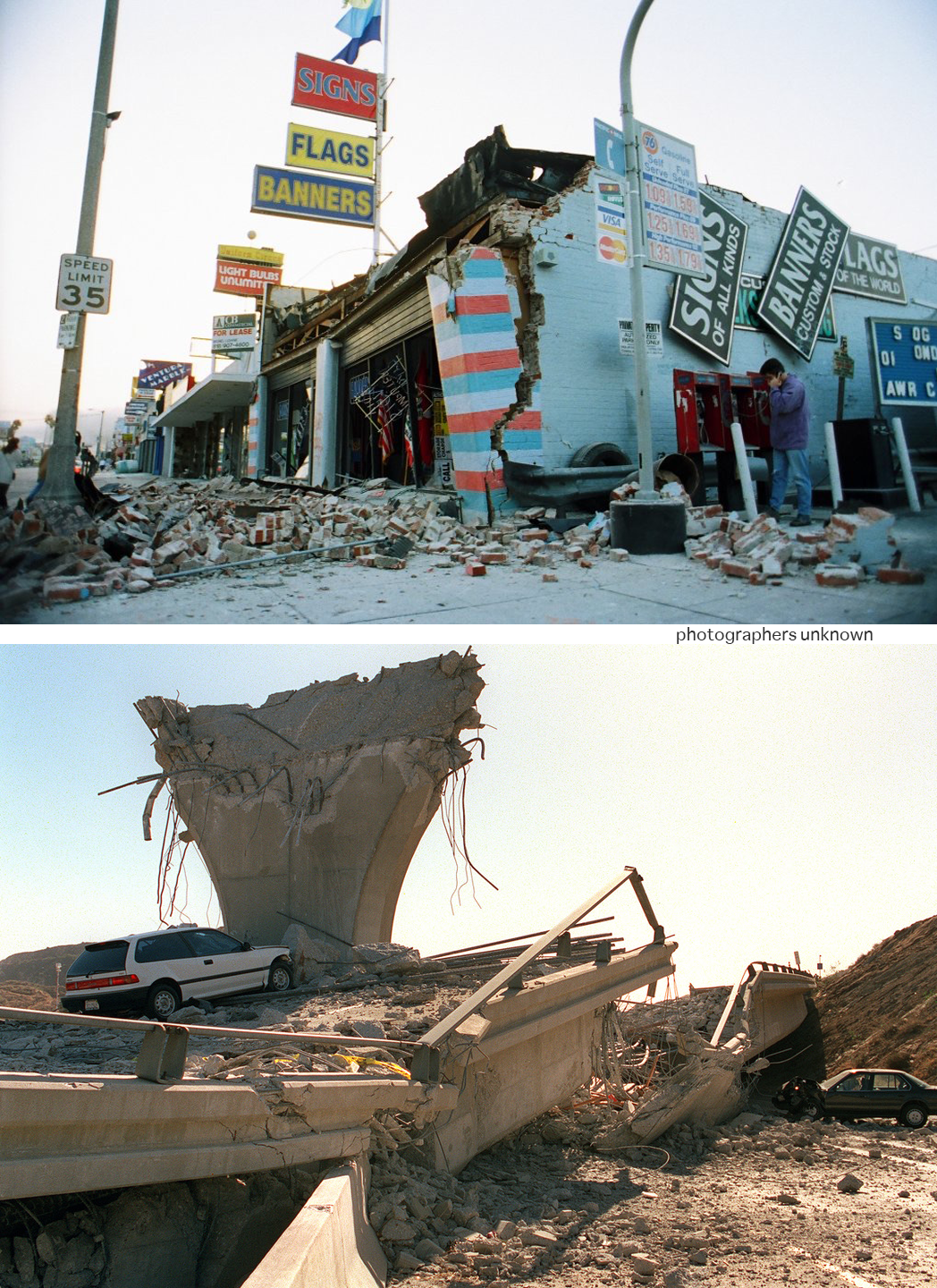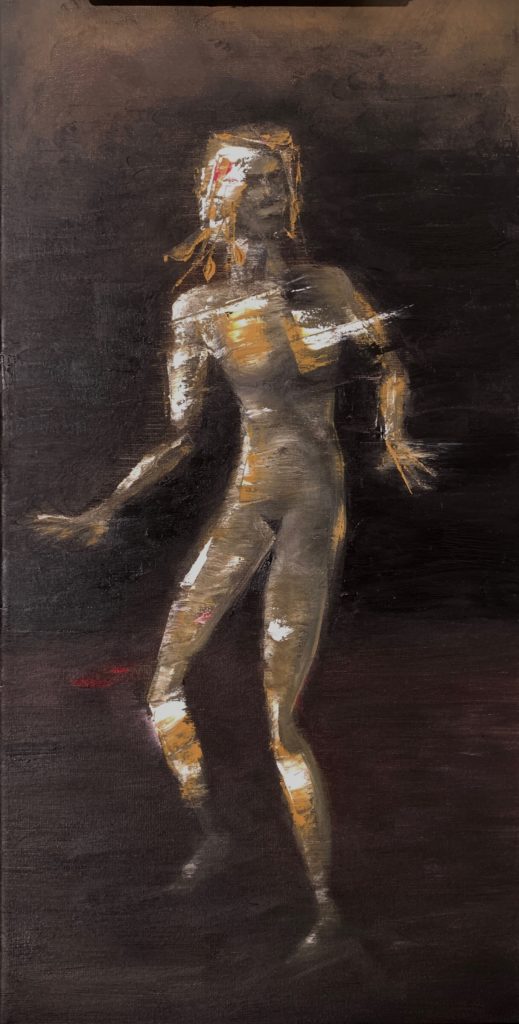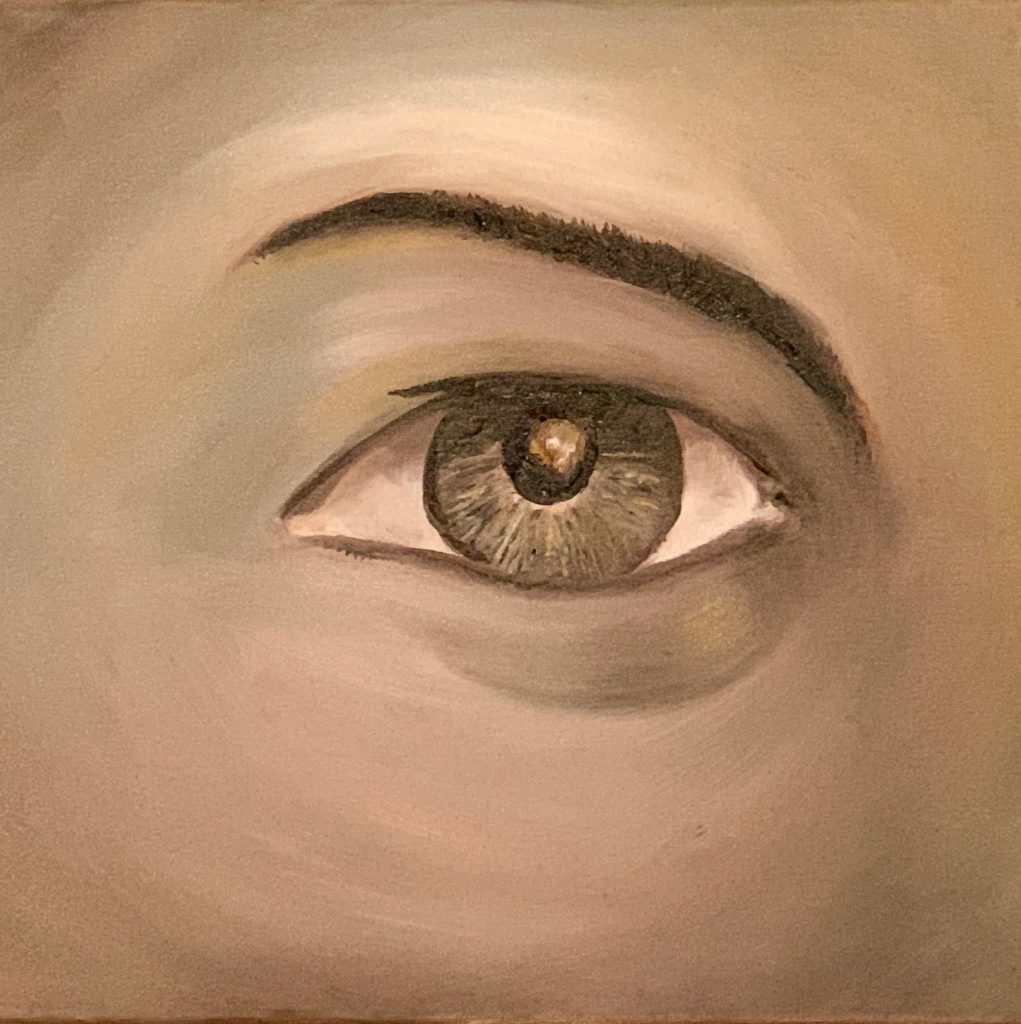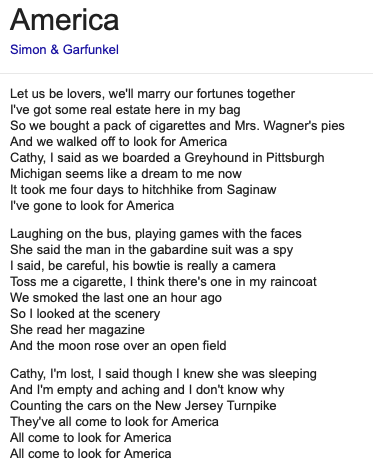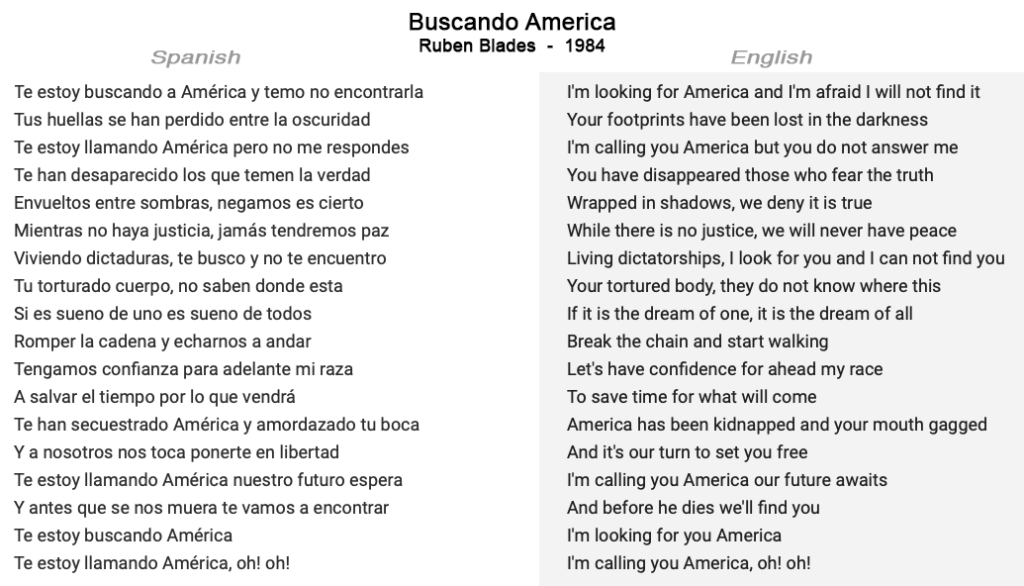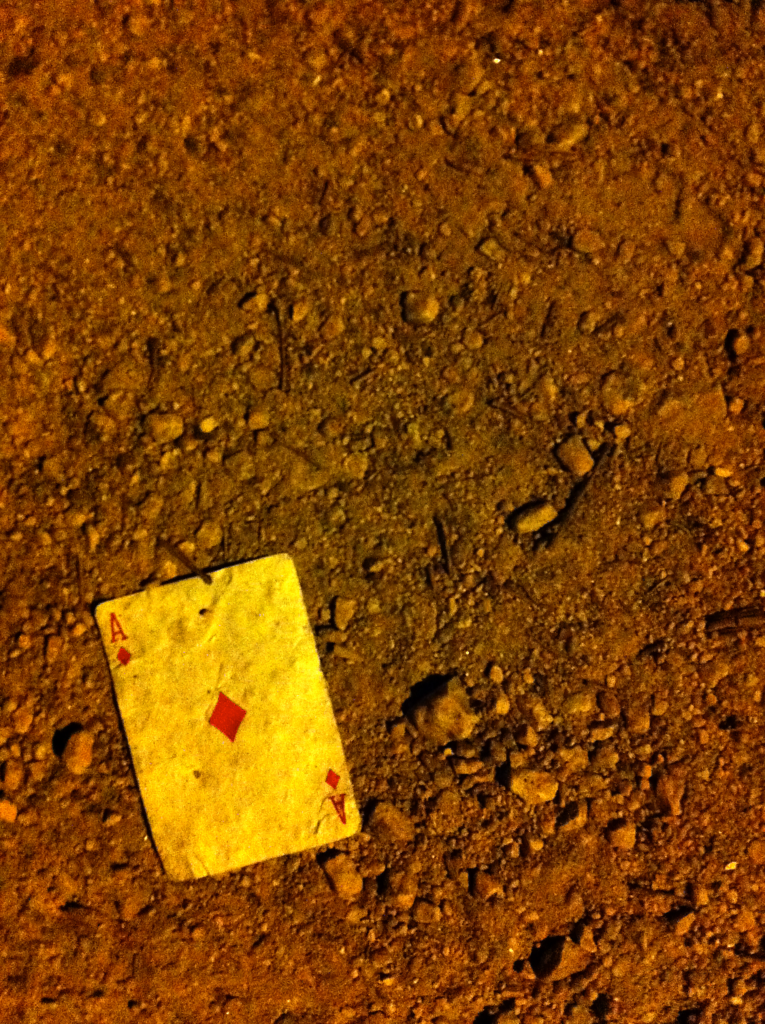In January of 1994, I was sleeping on the couch of some dear friends in LA when the Northridge earthquake hit and tossed me around the room like a rag doll. We were three miles from the epicenter, but from a dead sleep I had no idea where I was. I wrote the following account within a week of the quake.
People Like Me
Motherfuckin’ truck. Woah. Must be a double semi. Jesus! Is he in the room? What room? It’s so dark. Where the hell am I? I’m on a couch, Yo! I’m off the couch! Alright. I’m awake. Sort of. I’m in L.A. and God is bouncing me on his knee. I’ve been through this before. Just enjoy the ride. Damn. It’s so loud! Ol’ Jahweh is playin’ rough this time. It’s not stopping! Must be ten seconds by now.
Smash! Crash! Bam! Bam! Bam! Hey, okay, I’m scared already! Where is that glass smashing coming from? Shelves to the left and shelves straight ahead, shooting glass projectiles blindly through the blackness. Standing up is still out of the question, I’m pulling this comforter over me as a shield from the glass. Did the kitchen just explode’? Fuck you, Mama Nature, I’m keeping my cool. You can drop a rafter on my head and I’m gonna stay calm. No panic. That’s my rule. Bam! Bam! Shit! We’re testing the threshold of that rule tonight!
Why doesn’t it stop? These rumblers never last this long! Bam! Bam! Bam! Some 900 foot Magic Johnson is dribbling this building. This is no roller, we’re bouncing! The Eiffel Jackhammer is bustin’ the street. God is making a vodka martini for James Bond, shaken – not stirred, and we’re in the ice cube.
I can see the door. I almost have my feet back. I can almost stand; l may be able to get outside. Where is everybody? Are they hurt? I can’t hear anybody back there. I can’t hear anything but sounds of destruction. Wait! Somebody’s yelling, ‘Get out! Get out!’. Jesus, it’s me! That’s my voice! Screw it, I’ve gotta go back there!
Which direction am I going? I thought I was headed back heroically to help my friends. Am I running like a scared rat to the door? I can’t tell. I hear Deb’s voice. Who is that standing by the fence? Oh, chicken-shit, l am at the door, but I’m headed back in. Deb materializes in front of me like a ghost. I’m in her way. She’s yelling, ‘I’m naked! I’m naked!’, but I can only see the white nightgown wadded in her hands. I can tell Agey is right behind her, even though I can’t see him or hear him. Where’s Gabe?
Chronology is fucked. Everything is out of order. When was it that the three of us were jumbled in the hallway, yelling for Gabe in the other room? That may have been the scariest part -when he wouldn’t answer us. Was it before or after we were outside? lt seemed like it was at the same time. Or is that what’s happening now? When did the chaotic bouncing stop? Or should I say pause? Here it is again. Get out! Get out! No, we’re out. Gabe’s here. I’m in Deb’s way. Where’s Gabe? I know Agey’s here, I just know it. Deb’s yelling, ‘I’m naked’ and I’m trying to get past her to grab my comforter for her. I’m in her way, or wait, she’s already past me. Am I on the porch or in the kitchen? Blanket, I’m trying to find the blanket. Gabe grabs it. Gabe is here. Someone has a hand on Deb’s shoulder. It is Agey. We’re all out.
Time is dizzy, but it’s stopped spinning. The whirlwind of dark, fuzzy snapshot moments is relaxing and letting its debris settle to the ground. Ground? Fuck the ground! We sure as hell don’t trust the ground anymore! We knew the ground could tango, but we didn’t know it could slamdance. The Terra Firma Mosh Pit. No cover. No minimum.
There’s other people outside. Can’t really make them out, just bodies. Is that Ken and Tina? Yes, I hear Tina’s voice. She’s freakin’. Wait, that’s not Ken. Oh, that’s Cindy, their guest. Some vacation, huh. That’s who I saw by the fence. Okay, there’s Ken. Had he gone back inside?
A big white cocoon comes up the driveway. Two naked bodies, wrapped tightly as one in a puffy comforter. Their feet can barely move; tiny, quick twinkletoe steps like the Flintstones sneaking up on somebody. I can almost hear the little xylophone trill. It’s Tim and Lexi. They look like hostages bound together face to face, but they also look almost comfortable and secure in their cottony pod.
Frau Marion is busy lighting little candles. She seems very calm. Everybody is chattering away. Gabe says he needs a cigarette. That may seem inappropriate, but I had already had that thought myself. Gabe heads back inside, flicking an empty lighter repeatedly, lighting his way by the sparks from the flint. Deb shrieks at him. I reach inside and grab my jacket and yell, ‘Gabe, I’ve got some!’ but he’s already back with his smokes. He just needs a light.
Someone was missing. Santa Claus! Did anybody check on Santa Claus? Gabe makes for the door. Communication gets weird and several of us end up making our own individual searches for Santa. He is fine. He was watching TV (4:30 AM?) in his barcalounger and he managed to cover his drink. Santa’s an old pro. He takes natural disasters in stride.
The nervous chatter starts again. Tina tells us of Ken’s struggle to keep their 75-gallon aquarium from crushing them; forward and back, forward and back, until it finally smashed its backside against the wall and dumped gallons ai1d gallons of water across their bedroom. Lexi still has a massive case of the same flu Deb just recovered from, and she is urged to get some warm footwear. I offer up the van as temporary shelter, but everyone is too frenzied to get in a confined space. The aftershocks just keep coming and it’s just impossible to settle down. Cindy is pale and silently panic-stricken. She is from St. Louis and was scheduled to leave in a few hours. She doesn’t even know the rest of us. It is dark and cold and the neighborhood looks spooky with everyone running around waving their flashlights and shouting unintelligible things.
Nobody felt it was safe yet to go back inside, so we all huddled in the driveway and talked about what is important. From the ‘I don’t care about the stuff, I’m just glad we’re all okay’ to more personal revelations, everybody was dropping dialogue by flashlight. An amusing story drifts over from the building next door -which looks like a war zone – of a little girl bravely stating, “I’m gonna kill that earthquake!” It was Neighbor Appreciation Day.
We can see the stars. All the stars. Not just the two or three that are bright enough to be seen through the electric luminosity of the city, but entire constellations. It is as clear as in the desert or in the mountains. That should be obvious; without the glare, we are in the desert mountains. And this humongous desert mountain metropolis is dark.
Another cosmic spectacle usually invisible here is the dark lifting ever-so-slightly in the east prior to sunrise. We’re finally able to take turns sitting in the van with the heater on, but everyone insists the big sliding door on the side stay wide open for easy escape. Our street, Cahuenga, used to be a river and has a sandy base, so even in between aftershocks the ground is swimming slightly. Tina and Cindy are nauseous, and when Tim manages to snag a box of Saltines for them, they eat them in the van. Cindy displays her red, swollen, scraped knee and says it happened when she fainted. I didn’t even know – of course! Over by the fence! Cindy says Deb gave her expert advice on how to hold yourself to keep from blacking out completely, and Deb says she has no idea where that knowledge came from but she’s glad it worked.
The radio lets us know that a lot of people are worse off than we are. The death toll goes up about as often as the aftershocks, which are at least every ten minutes. It’s nerve-wracking, and the weird Orson Welles ambience from the static in the speakers only makes it more eerie. AM radio gets its shit together while most FM stations are still pumping out their pre-programmed schlock.
It’s been over three hours from the rudest awakening since John Wayne Bobbitt, and I step out past the forced-open security gate to have a smoke. Agey tells the story of his last earthquake. He was staying at Jono’s and was heavy-duty hungover. He opened his eyes to the sight of linoleum tiles separating and revealing the glue underneath. Jono raced out like a rock-and-roll Dustin Hoffman clad only in leopard-skin bikini briefs. He wedged himself in a dramatic “X” in the doorway and yelled, “Kiss your ass goodbye!” I’ve been giggling off and on every time I think of that story.
The blue-grey sky is now giving off enough light so that we can see inside somewhat. Agey and Deb’s kitchen is a mess. A huge brand-new bottle of extra-virgin olive oil has crashed like the Exxon Valdez leaving a quarter-inch slick on the floor. The fridge and freezer have dumped their contents into the goo, including a package of frozen burritos. After the fridge completed its kangaroo dance, bouncing around like refrigerators usually don’t, it came to rest on top of the unfortunate burritos. Yuk.
Marion’s place, directly above us, is completely trashed. Everything is down on the ground; china cabinets, vases, lamps – can’t really make it all out. A huge pile of stuff. How the hell did she get through that? She can’t find her cat anywhere. Cats! Bobbin lives across from Marion and is skiing in Tahoe. She has two cats in there. Somebody comes up with the keys and volunteers to check. Her apartment is like Marion’s – wrecked, The big TV is standing on its head in the middle of the floor. The kitchen and the bedroom are disasters. I can’t find the cats anywhere, but with all these aftershocks, I don’t want to stay upstairs long.
Nobody seems to have a jam box with working batteries so Agey and I walk up the street to see if anything is open (ha ha) or maybe it was just to walk. Virtually every chimney is lying in brickpiles and red spanish-tile roofing is everywhere. We see a collapsed carport, broken windows, walls leaning way over waiting to fall, cars smashed by falling debris, etc. The power seems to be out everywhere so we return to the apartment.
Something about a natural disaster sure makes you hungry. Maybe it’s all that adrenalin burning up calories. We decide to do a big breakfast barbecue by the pool and everybody seems relieved – if only slightly • to have something to do. Gabe does the bacon and Deb whips up a huge batch of scrambled eggs and donates her crumpets which prove delicious grill-toasted. Marion miraculously manages to make coffee one cup at a time.
I need to make a confession on behalf of all People Like Me. Try not to leap to the simplistic conclusion that People Like Me are sick and twisted. We are not. But even at the risk of your scorn, I must admit that People Like Me dig this shit. We don’t want to see anybody hurt and get no more lewd thrill from destruction than anybody else. Those aren’t the things we dig. We dig the Earth in progress. The Santa Monica and San Gabriel Mountains are two feet higher! Somebody has to go change all those elevation signs. The San Fernando Valley has lost width – I have no idea how they measure things like that. The planet does a shift and we shift, too. Everybody is temporarily forced into living existentially. It can be a healthy mindscape. And People Like Me just love to see the rules thrown out the window. We love to see the giant gears of Society’s well-oiled but often preposterous machine grind to a halt. Suddenly, the little guys matter. Suddenly, we’re responsible for our own immediate destiny, instead of on some absurd chase to create a future destiny. Suddenly, there are no bullshit authority figures. Mama Nature showed us who is really boss, with a display of such incredible power that every single witness is awed. We are reminded that we are microscopic lice on the scalp of the Earth, just in case we’ve forgotten. Little proud bacteria strutting around like we own the joint, thinking we have control. People Like Me dig this lesson in perspective, from the world’s greatest teacher. We also can see the importance of bacteria; us. We realize that all is connected even if we don’t understand it most of the time. We are real and we matter. We are not a number, we are not a statistic, we are not a job title, we are not a duty. But we may be a father or a mother or a child or a friend.
The People Like Me and the People Almost Like Me Except They Don’t Dig This Shit decided we should get some batteries and some water. We drove around in the destruction, finally finding some places in Burbank that had power. Most still could not open for business because they were trashed. A jam-packed 7-11 was out of batteries and water and the ATM machine was a no go.
We dropped Agey and Gabe off at a Smart & Final that thought it might be able to open in an hour. Deb, Ken, and I continued our search and managed to find a working ATM. I felt lucky to have a full tank; the few open gas stations had long lines reminiscent of the crisis in the 70’s. Deb spotted a small mini-market and we circled back. No batteries and only a few bottles of water. Back to the Smart & Final to join Agey and Gabe in what turned out to be a two-hour wait.
After a rather exciting mad dash through the store, we now had a couple dozen batteries, over twenty gallons of water, five or six flashlights, a gargantuan package of turkey franks and buns, a bottle of wine, milk, and other survival wealth. We scored!
People Like Me enjoy living in the Now; in that Heavenly Plane of Present Tense. The chores can wait. The bills can wait. They are not even considerations. Possessions don’t mean shit. What is important is right in front of you, each second is new. People Like Me don’t wish a natural disaster on anyone. Or a riot, which summoned up the same feelings. We would never create a terrifying situation just to savor it. But once there, we function well. It is the beautiful phase of Anarchy, the spiritual part, where everybody is truly free, before mankind’s congenital disease called Control begins to take hold again, and the distinction between friend and foe gets blurred again, and everybody gets confused again, and people start buying in to whatever collective illusion of Order suits their fears. Spiritually, that’s death. This is birth. It is when you can see what you’re made of. It is an opportunity for higher awareness.
And it is also NOT that. It is also the opposite of that. It is, too, the essence of Pragmatism; realistic, non-bureaucratic, non-political practicality. It is Agey and Ken scrounging up flashlights in seconds. It’s Tim and Lexi stretching their phone out to the new ‘safe zone’ in front. It’s backing the van into the safe zone. It’s huddling in the van listening to the radio waiting for the heater to kick in. It’s mouth-to-mouth networking of information like which stores have water and batteries, how long the lines are, which neighborhoods have power, what area codes we can get and which calling cards work. etc. It’s being alive! What’s not to love?
Well, okay, it was scary. Very scary. But fear is part of life, every single day, and how we deal with it shapes who we are. Sometimes when we embrace our fears they disappear and other times we just impress ourselves with our ability to cope. And sometimes you just get devoured.
Case in point: we returned to the apartment and heard a bizarre story. Lexi had taken her finch and her zebra finch – two birds the size of your thumb – out of the big cage and put them in the small cage and set them on the front porch. A large hawk swooped down, forced apart the bars of the wire-frame cage, snatched a finch and took off.
The remainder of that Monday found most of us as un-nerved as that remaining finch. Every few minutes the Earth would tremble again, erasing any attempts we had made to return to sanity. Most unsettling to me was seeing everybody leave their guns around in plain view. Nobody remembered that this was Martin Luther King Day. It was also my mother’s birthday, but she understood my neglecting to wish her a happy one once I finally got a line out. My brother said later her birthday must be cursed; the Persian Gulf War started on this day, too.
Everyone was exhausted and our legs felt like rubber. We all just wanted to lie down, but nobody trusted our geological foundation. Some caught quick naps that were usually interrupted by a rumbler. Agey and I finally went inside and he took the couch and I took the floor, and no sooner had we gotten horizontal and closed our eyes than the windows started that chaotic jangling and, for all appearances, a repeat of the morning was beginning. It never made it to the 6.6 that started it all, but this 5-something was followed by another 5-something and we were all rattled – physically but more important psychologically – again.
Late in the day, it looked like the power was returning. We switched on TVs and saw pictures that didn’t reach the edges or were majorly letterboxed; half-size images with a thick black border all around. Some screens looked drunk; the picture swam nauseously back and forth – too similar to how we all felt. Then they all cut out completely. The lights stayed on but just barely. They looked brown. Ken got his voltage meter and measured the outlets. We had 66 volts. 6.6 quake. 66 volts. Numerology freaks, have at it.
My elementary understanding of alternating current (AC power) told me that it was usually all or nothing, and this theory was repeated by many, including Roger, who was a head electrician in a former life. Even when we called DWP, they tried to tell us that it was impossible to have 66 volts. But we would be sitting under dim brown lights for two more days.
Armed with our battery of batteries, Ken loaded up his little black and white portable TV and we all huddled around the little 3 or 4 inch screen squinting to see pictures of the roller coaster highways we had heard about on the radio. We finally saw the disaster site in Northridge. Mike Medic called. He lived in that fateful apartment little more than a year ago.
Nobody could stay too far from the door. Ken and Tina grabbed blankets and pillows and came over. Agey, Gabe and Ken set up camp on the living room floor, while Deb and Tina could not lie down. They sat up on the couch. I agreed to stay awake and keep watch. I watched that tittle TV for hours on end. Periodically, I would take a flashlight and patrol the premises. Once, I heard a strange sound and went out front to investigate. I crept around the parked cars and discovered the electronic security gate opening and closing spastically. It was creepy. Then I saw the man in the alley.
It turned out to be Santa Claus, and he was as apprehensive about my identity as I was of his. I showed him the gate, and he realized he had his gate remote in his hand – the same hand he used for his cane – and he was pressing the button inadvertently with each step. Whew. I went back to watch over the slumber party.
Despite being a strong, independent woman, Deb is having a bad case of Post Traumatic Stress Disorder. The boob tube discussed this condition after the floods, after the riot, and after last fall’s fires. Tina is PTSD-ing as well. It is surely easy to understand this time around, what with God sticking a quarter in the Vibromatic every five minutes. Nerves will stay frazzled for quite a while around here.
Kinda hard to write about this event, mainly because of its inverse relation to story lines. In this case, the climax is the beginning, and the development follows. The action gets less intense and there is no real ending. As I was writing that last sentence, eighty-two hours after the original quake, a silent sonic-boom of an aftershock hit the room with a single, solid uppercut. I realized Tina was home alone and would be freaked, so I went to check. She was already out her door. Gabe was watching TV, and the news cut in to tell us it was a 3.6, and that we had already been through 1500 aftershocks. [As I was editing this on Friday morning, we were hit by a series of the strongest shocks since Monday; 4-somethings. When will this end?] They told us to expect ten-thousand of them before we’re done. Done for how long? People Like Me would like to report that we’re not having fun anymore. People Like Me would like to tell Mama Nature that we’ve got the message already.
°°° ——— °°°
[originally written during the week between January 17, 1994 – the date of the earthquake – and January 24, 1994. Sent by fax to friends exactly one week after the event. Special thanks to Katherine for saving this writing and sending it back to me over twenty-six years later.]

